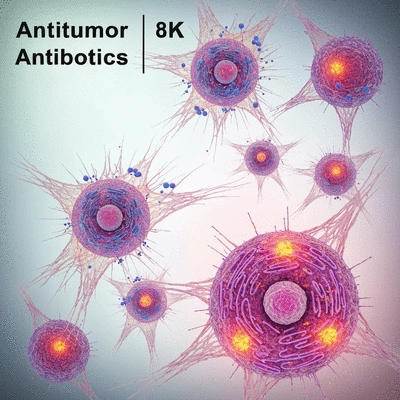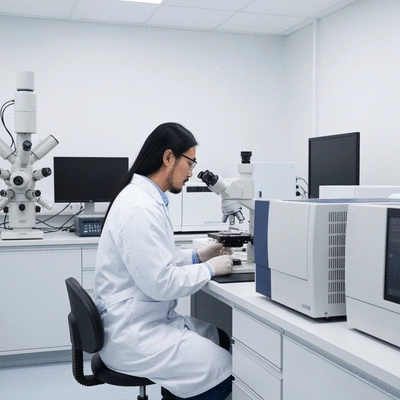Support Resources During Chemotherapy
By Dr. Elise Carter / Jan 28
When discussing cancer treatment, antitumor antibiotics stand out as powerful medications in the oncologist's arsenal. Their role is crucial, yet often misunderstood. What makes these drugs so significant in the battle against cancer?
Antitumor antibiotics employ several key strategies to combat cancer cells. The visual below details these critical mechanisms.
These drugs directly interfere with the DNA replication process, preventing cancer cells from dividing and multiplying. This is a fundamental way to halt tumor growth.
Antitumor antibiotics often generate free radicals, leading to oxidative stress within cancer cells. This damage can be lethal to the cells, causing them to die.
These agents can trigger apoptosis, a natural process of programmed cell death, specifically targeting malignant cells to eliminate them from the body.
Antitumor antibiotics are frequently used in combination with other therapies to significantly enhance overall treatment effectiveness and achieve better patient outcomes.
When we talk about cancer treatment, one term that often comes up is antitumor antibiotics. But what exactly are these medications, and why are they significant in the fight against cancer? Understanding their role is crucial for anyone navigating their treatment journey. As someone deeply committed to patient education, I aim to shed light on these vital agents.
In essence, antitumor antibiotics are a class of medications specifically designed to combat various forms of cancer. They work by targeting and inhibiting the growth of cancer cells through different mechanisms, which I’ll explain shortly. These drugs are typically used in a combination therapy setting, helping to enhance the overall effectiveness of cancer treatment plans.
Antitumor antibiotics are derived from natural sources, primarily Streptomyces bacteria, and are characterized by their ability to disrupt the cellular processes of cancer cells. They are classified based on their mechanisms of action and can be broadly categorized into several types, including:
Each of these drugs has unique properties that make it effective against specific cancers. For instance, doxorubicin is a cornerstone in chemotherapy for various cancers, including breast cancer and lymphoma, while bleomycin is often used in the treatment of testicular cancer.
Antitumor antibiotics play a vital role in cancer treatment for several reasons. First and foremost, they have shown remarkable efficacy in shrinking tumors and controlling cancer spread. This is particularly important in aggressive cancer types, where rapid treatment is essential. Additionally, using these drugs can improve survival rates when part of a comprehensive treatment plan, as highlighted in research on their impact on overall outcomes and patient care.
Here are a few key reasons why these antibiotics are critical:
As patients and caregivers, it’s essential to grasp the importance of these medications in your overall treatment strategy. This understanding can empower you and your loved ones to make informed decisions regarding therapy options.
Antineoplastic agents, including antitumor antibiotics, are central to modern oncology practices. They not only serve as primary treatments but also as adjuvants in conjunction with surgery and radiation therapy. With their dual role, they can effectively target residual cancer cells after surgical interventions. Research continues to explore the extensive applications of these agents, as seen in ongoing studies regarding antineoplastic drug development.
Moreover, ongoing research continues to uncover new aspects of these agents, from enhancing their effectiveness to minimizing side effects. Understanding the evolving role of antineoplastic agents provides hope and avenues for better patient outcomes. As a community, we’re committed to sharing this information to help patients and caregivers navigate their cancer journeys with confidence.
When discussing antitumor antibiotics with your healthcare provider, consider asking about the potential for combination therapies. Many studies suggest that using these antibiotics alongside other treatments can significantly enhance their effectiveness, leading to better outcomes in your cancer treatment journey.
Antitumor antibiotics play a critical role in the fight against cancer, offering unique mechanisms that help to disrupt the cancerous processes in the body. These powerful agents work by targeting rapidly dividing cells, making them essential in many treatment regimens. As a cancer specialist, I often see how understanding the mechanisms behind these drugs can empower patients, giving them insight into their treatment plans.
Here are some key takeaways regarding the mechanisms and efficacy of antitumor antibiotics:
It's important to discuss your specific treatment options with healthcare providers, as the effectiveness may vary based on individual circumstances. Understanding these nuances can significantly impact a patient's experience and outcomes during chemotherapy.
The landscape of cancer treatment is continually evolving, with ongoing research aimed at improving the efficacy and safety of antitumor antibiotics. There is a significant focus on exploring new combinations of existing drugs, as well as the development of novel agents that may overcome resistance. At Types of Chemotherapy, we stay updated on these advancements to provide the most accurate information possible.
Some areas of research that I find particularly exciting include:
By understanding where research is headed, patients and caregivers can be better prepared to discuss their treatment options with healthcare professionals and stay informed about potential future therapies.
As you navigate your cancer treatment, having access to reliable resources can make a world of difference. At Types of Chemotherapy, we strive to be that trusted resource, providing oncologist-reviewed information to help patients understand their options. It's vital to seek out support systems that resonate with you.
These resources not only enhance your understanding but also foster a sense of community during challenging times.
When discussing treatment options, I encourage patients to be proactive in their conversations with their healthcare teams. Asking the right questions can clarify treatment paths and address any concerns you may have. Here are some questions that may be helpful:
Being informed equips you to make decisions that are best for your health and well-being.
Personalized medicine is changing the way we approach cancer treatment, tailoring therapies to individuals based on their unique genetic profiles. This approach can significantly impact the effectiveness of antitumor antibiotics. By understanding your specific cancer type and its characteristics, healthcare providers can recommend treatments that are more likely to be effective for you.
Some key aspects of personalized medicine include:
Embracing this personalized approach can lead to better outcomes and a more tailored experience in your cancer journey.
Here is a quick recap of the important points discussed in the article:



 Support Resources During Chemotherapy
Did you know that support resources can significantly ease the journey through chemotherapy? Underst
Support Resources During Chemotherapy
Did you know that support resources can significantly ease the journey through chemotherapy? Underst
 Supporting Mental Health in Chemotherapy
When you think about cancer treatment, how often do you consider the emotional toll it takes on pati
Supporting Mental Health in Chemotherapy
When you think about cancer treatment, how often do you consider the emotional toll it takes on pati
 Chemotherapy's Impact on Relationships
Have you ever considered how a cancer diagnosis can reshape the relationships around you? The emotio
Chemotherapy's Impact on Relationships
Have you ever considered how a cancer diagnosis can reshape the relationships around you? The emotio